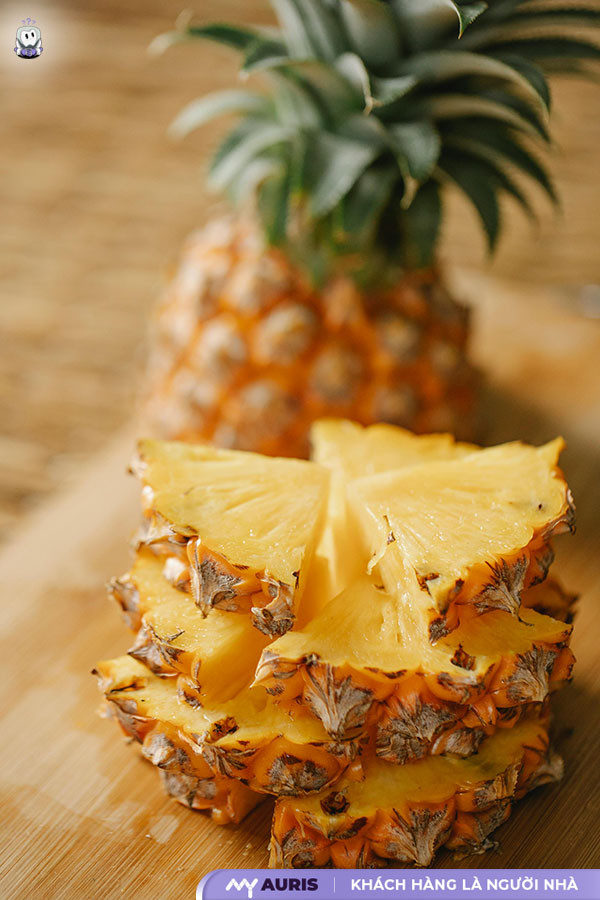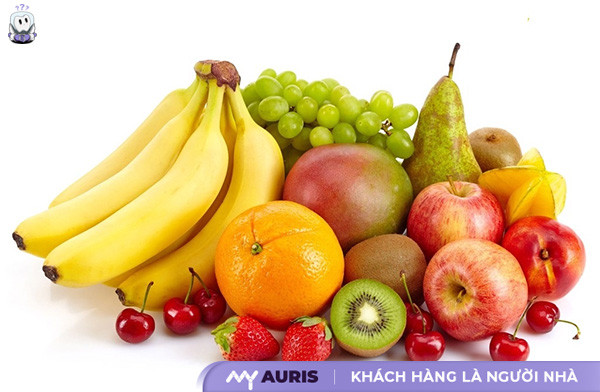Pregnant women need to pay attention to every type of food they consume. Among them, pineapple is a popular fruit, but many are concerned that eating pineapple can cause uterine contractions and affect the fetus. So, can pregnant women eat pineapple? This article from My Auris Dental Clinic will clarify this issue in a clear, easy-to-understand, and scientific manner.
Can Pregnant Women Eat Pineapple?
Many believe that pregnant women eating pineapple can increase body temperature, stimulate uterine contractions, cause miscarriage, or lead to issues like allergies and diarrhea. The main reason lies in bromelain – an enzyme found in pineapple.
In reality, nutritionists advise expectant mothers against taking bromelain supplements as they can cause abnormal bleeding. This has led to concerns that pineapple might pose a similar risk. However, the amount of bromelain in fresh pineapple is very low and not strong enough to affect the health of pregnant mothers or fetal development.
Only when consuming an excessively large amount of pineapple at once (from 7 to 10 pineapples or more) can it have adverse effects on the body. This is extremely rare in practice. Therefore, expectant mothers can absolutely eat pineapple in moderation, from ½ to 1 pineapple per day, to gain numerous nutritional benefits.
According to nutrition experts, pineapple is a fruit rich in vitamins and nutrients, offering many health benefits for pregnant women, specifically:
Vitamin C in pineapple helps boost the immune system, prevent the risk of illness, and contains antioxidant compounds that support healthier, more beautiful skin.
Manganese – a mineral found in pineapple – is essential for the health and metabolism of expectant mothers.
Copper helps create blood cells and plays a role in many important bodily functions.
Vitamin B9 (folic acid) in pineapple supports tissue growth, which is particularly important during pregnancy.
Pineapple also helps reduce morning sickness symptoms, making expectant mothers more comfortable during the early stages of pregnancy.

Is Eating Pineapple During Pregnancy Dangerous?
Many pregnant women believe that pineapple is a fruit to be avoided during pregnancy. This concern stems from an enzyme called bromelain, which can affect the cervix if consumed in high amounts. Additionally, the sour taste and acidity of pineapple can irritate the stomach, especially when the digestive system is weak. Therefore, a cautious mindset is completely understandable, especially for pregnant women in their first trimester – a period when the fetus is still unstable.
However, in reality, the amount of bromelain in a normal serving of pineapple is not enough to cause uterine contractions or affect the fetus. The dosage is important.
According to nutrition experts and obstetricians, eating pineapple during pregnancy is not dangerous if consumed appropriately. Some important points:
- Bromelain in pineapple is primarily concentrated in the core. When pineapple is thoroughly peeled, the bromelain content is significantly reduced.
- Pregnant women should avoid eating too much at once. It’s best to eat only 1-2 small pieces and not continuously for many days.
- Pregnant women in the first trimester should limit pineapple, especially if there is a history of threatened miscarriage, bleeding, or a sensitive uterus.
- From the fourth month onwards, pineapple can be added to the diet in reasonable amounts, especially for pregnant women from 5 to 7 months.
Pineapple contains a lot of vitamin C, which helps boost immunity and aid digestion. If consumed correctly, it is still a beneficial fruit during pregnancy.

Some Fruits Good for Pregnant Women
Pregnant women need to maintain a balanced and reasonable diet. Among them, fruits play an important role in providing vitamins, minerals, fiber, and water to the body. Choosing the right fruits not only helps expectant mothers stay healthy but also supports the comprehensive development of the fetus. Below are some fruits suitable for each stage of pregnancy that can be incorporated into daily meals.
Bananas
Bananas are rich in potassium and fiber. Potassium helps regulate blood pressure, while fiber improves the digestive system and reduces constipation – a common condition for pregnant women in the first trimester and subsequent months. Expectant mothers can eat ripe bananas after breakfast or mix them with unsweetened yogurt for easier digestion.
Apples
Apples provide vitamin C, which helps boost immunity. Additionally, this fruit contains soluble fiber pectin, which aids the digestive system, making it especially suitable for pregnant women from 5 months onwards. Apples should be thoroughly washed; organic apples can be eaten with the peel. Avoid apples that have been soaked in preservatives.
Oranges, Grapefruits/Pomelos
Oranges and grapefruits/pomelos are rich in vitamin C, calcium, and folate. These nutrients are beneficial for the development of fetal bones, teeth, and nervous system. Oranges and grapefruits/pomelos also help pregnant women in their 6th or 7th month reduce swelling due to their natural diuretic properties. It’s best to eat them directly rather than drinking canned juices, as high-calorie drinks can lead to uncontrolled weight gain.
Avocados
Avocados are a source of beneficial unsaturated fats for the formation of the fetal brain and nervous system. This fruit also contains vitamins E, C, K, and B-group vitamins, which enhance the overall health of the mother. Avocados can be eaten fresh, blended into a smoothie with unsweetened milk, or used in salads.
Ripe Papayas
Unlike unripe papaya, ripe papaya is soft, sweet, and safe for pregnant women when eaten in moderation. The enzyme papain in papaya helps stimulate digestion, reduce bloating and constipation – especially useful for the digestive system in late pregnancy. However, it should only be eaten in small amounts, 1-2 times per week.
Kiwis
Kiwis have a very high vitamin C content, which helps the body absorb iron better. This is especially important as expectant mothers are prone to anemia. Additionally, kiwi contains vitamins K, E, and folate. Choose ripe, soft kiwis, wash the skin thoroughly, or cut them in half and eat with a spoon.
Watermelons
Watermelons have a high water content, which helps reduce body heat and prevent dehydration in pregnant women. This fruit also contains lycopene, which protects cells and boosts immunity. Watermelon should be eaten after main meals, and not when overly cold or on an empty stomach.
Choosing the right fruits not only helps expectant mothers maintain stable health but also contributes to the comprehensive development of the fetus. Make fruits an indispensable part of your daily diet, combined with pure filtered water, limiting poor-quality calorie-free beverages, sugary milk, and unverified bottled drinks. Such small daily habits will be a solid foundation for a safe, scientific, and healthy pregnancy.





